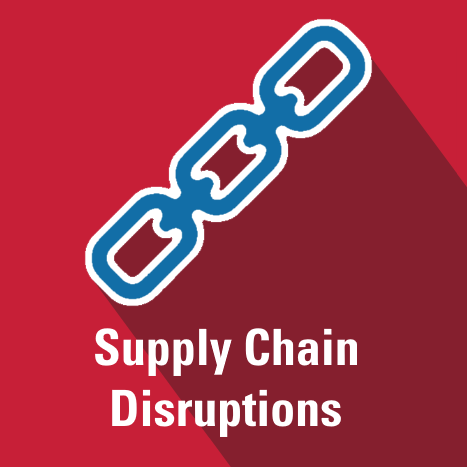Current Updates (July 19, 2021)
The pace of vaccinations within Iowa and across the country has slowed as the vast majority of people who desire to receive the vaccine have been vaccinated. The state has started the process of shutting down their mass vaccination and testing sites across the state. Anyone desiring a vaccine can visit their local pharmacy or health clinic to get vaccinated. Currently health officials have only authorized the vaccines for use in people who are 12 years of age or older. Trials continue for children below 12 years of age.
The COVID-19 Delta variant continues to become more prevalent in the US and globally. Many locations overseas continue to struggle to contain the virus including those in Asia, Africa and Latin America. Many face continued or increased COVID-19 mitigation measures including Indonesia, Singapore, Malaysia, Spain and France. At the same time many countries are lifting restrictions including England.
CIRAS will continue supporting manufacturers and businesses in Iowa as they recover from the COVID-19 pandemic, however we are also transitioning to the new normal with everyone else. As such our COVID-19 Business Resources webpages and resources will be removed and archived at the end of July. If you still require access to any of these resources you can contact your account manager or Marc Schneider at maschn@iastate.edu.
Business Resiliency Webinar Series. This series, which occurs every Tuesday at 7:30 a.m, will finish at the end of July. Our remaining two sessions will be on the topics of Flexible Automation on July 20th, and a final COVID-19 general update on July 27th. For more information contact Marc Schneider at maschn@iastate.edu or register to attend here. All previous topics continue to be available in our COVID-19 Webinar Library.
Current supply chain issue updates include:
- The surge in both retail and industrial buying as industries rebuild their supply chains during the economic recovery continues to stress global and domestic supply chains. The Union Pacific railroad recently announced they are temporarily suspending eastbound service from West Coast port terminals to its Midwest rail terminals to ease congestion and backlogs.
- Manufacturers continue to feel the impacts from shortages of semiconductor chips. General Motors has announced they will eliminate some features on their full-size pick-up trucks to reduce the quantity of chips required.
As the nation and world recovers from the COVID-19, pandemic supply chains continue to feel the on-going effects, including inventory shortages, inventory overages, transportation price increases, and transport capacity imbalances. Companies also should be sure to improve their supply chain resiliency and have active risk management plans in place. We are already seeing new supply chain challenges, increases in the price of raw materials and finished goods, and potential future disruptions.
Previous Updates (April 27, 2021)
Iowa has administered more than 2 million doses of the COVID-19 vaccine with more 911,000 total vaccine series being completed. This places Iowa slightly better than the national average in total doses administered. We’re in the top third in terms of total vaccine series being completed and utilization of doses allocated to the state, per figures from the CDC and the Iowa Department of Public Health.
Use of the Johnson & Johnson (Janssen) vaccine has resumed in Iowa after a temporary pause to allow researchers to examine rare instances of blood clotting side effects from the machines. However, new issues have arisen. Forty-three counties in Iowa declined some or all of their allocations for this week based a lessening demand for appointments.
Since April 5, all Iowans are eligible to receive a vaccine. You can check the following resources to help find a vaccination location and appointment:
https://coronavirus.iowa.gov/pages/vaccineinformation#VaccineProviders
https://vaccinate.iowa.gov/providers/
https://vaccinefinder.org/
https://www.vaccinespotter.org/
https://www.vaccinehunter.org/
https://twitter.com/IAVaccineAlerts
Business Resiliency Webinar Series. This series continues every Tuesday at 7:30 a.m. For more, contact Marc Schneider at maschn@iastate.edu or register to attend here. Previous topics are available in our COVID-19 Webinar Library. Upcoming topics include:
April 27 Growing Your Business Via Exports
May 4 TBD
May 11 Using technology to make your factory more agile.
May 18 General COVID-19 Updates
May 25 Finding better suppliers (supplier scouting).
June 1 Managing Business Risk
June 8 Developing a flexible labor force.
June 15 Using TCO tools to Reduce Supply Risk
June 22 General COVID-19 Updates
Current supply chain issue updates include:
- The global shortage of semiconductor chips continues to affect various industries, including automotive with the major OEM’s announcing various temporary plant shut-downs or slow-downs due to a lack of chips.
- Due to the increased container ship dwell times and port and hub congestion, there are fewer empty containers available for exporters. Carriers have started to add extra ships to move empty containers back to their points of origin for loading, as well as placing record orders for additional shipping containers from manufacturers to try to address this issue.
As the nation and world recovers from the COVID-19, pandemic supply chains continue to feel the on-going effects, including inventory shortages, inventory overages, transportation price increases, and transport capacity imbalances. Companies also should be sure to improve their supply chain resiliency and have active risk management plans in place. We are already seeing new supply chain challenges, increases in the price of raw materials and finished goods, and potential future disruptions.





